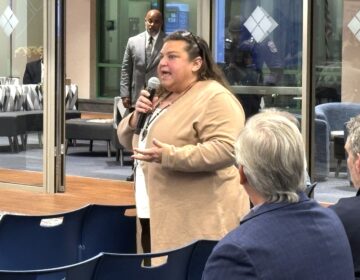Delaware lawmakers to again consider legalizing physician-assisted suicide
Supporters say the bill has numerous safeguards like requiring the patient to self-administer the medication.
Listen 0:56
Legislative Hall in Dover, Delaware. (Johnny Perez-Gonzalez/WHYY)
From Philly and the Pa. suburbs to South Jersey and Delaware, what would you like WHYY News to cover? Let us know!
This story was supported by a statehouse coverage grant from the Corporation for Public Broadcasting.
Delaware lawmakers will once again consider legalizing physician-assisted suicide after outgoing Gov. John Carney vetoed a similar bill last year.
State Rep. Eric Morrison, D-Glasgow, and Senate Majority Leader Bryan Townsend, D-Newark, are sponsoring the new legislation.
Morrison said he has advocated for allowing physician-assisted suicide for many years, first as an activist outside of government and then as a state legislator. He said his support of the concept comes from caring for his mother before her death about five years ago.
“We lost my mother to lung cancer, and over a six-month period, I watched her die an absolutely agonizing death,” he said. “Not only did she lose her physical health, but she completely lost her mind.”
Morrison’s bill and former Rep. Paul Baumbach’s one from last year, the Ron Silverio/Heather Block Delaware End of Life Options Act, have similar language. Baumbach’s bill was named for two advocates who died in 2018.
The legislation would allow people with fewer than six months to live to request and ingest medication to end their lives. It provides safeguards including requiring two doctors to certify the patient is mentally fit, making an informed decision and acting voluntarily.
In a news release, Townsend said he supports a compassionate option for terminally-ill Delawareans who are “needlessly suffering.”
“Respecting people’s personal liberties and choices means honoring the right of adults to make informed decisions about their own bodies,” he said in a statement, “including the choice to seek compassionate care when facing a terminal illness that causes unbearable and irreversible suffering.”
Last year was the first time legalizing physician-assisted death passed the General Assembly since Baumbach first introduced it in 2015. But the bill only narrowly made it through each chamber. The bill passed the Delaware Senate on an 11-10 vote and the House approved it on a 21-16 vote.
Carney vetoed the legislation in October. In his message to the General Assembly, he said he was against allowing the terminally ill to end their lives with a physician’s help. He said he has been consistent and public about his position on this issue.
“Although I understand not everyone shares my views, I am fundamentally and morally opposed to state law enabling someone, even under tragic and painful circumstances, to take their own life,” he said in his statement.
Morrison said while he’s aware of the daunting task ahead to get the bill through both chambers again, he’s optimistic.
“I’ve already been working hard talking to legislators, and I feel very, very good about where the bill is,” he said. “Governor-elect Meyer has publicly committed to signing the bill, so I think this will be a very good year for this legislation and for its supporters.”
Some disability advocates oppose legalizing medically assisted suicide because of several concerns, including that people with disabilities could be manipulated to end their lives, instead of receiving what could be expensive medical care.

Get daily updates from WHYY News!
WHYY is your source for fact-based, in-depth journalism and information. As a nonprofit organization, we rely on financial support from readers like you. Please give today.







